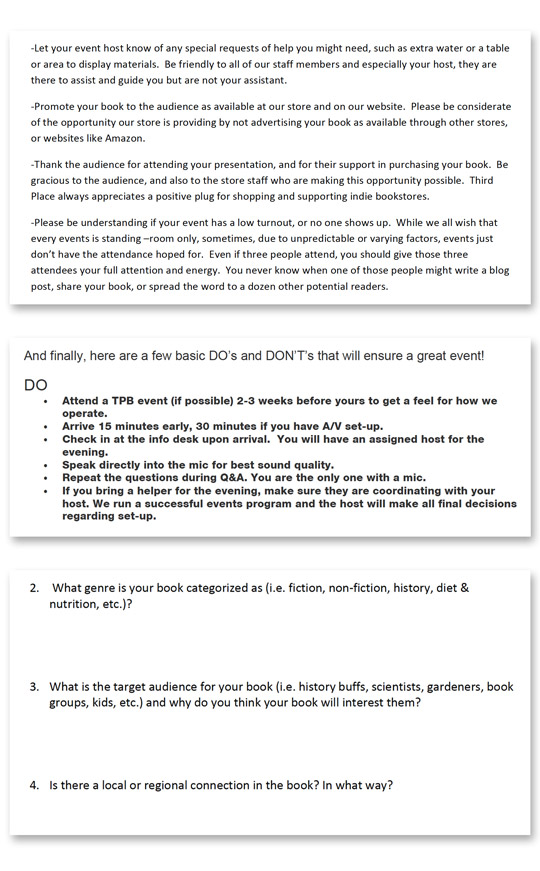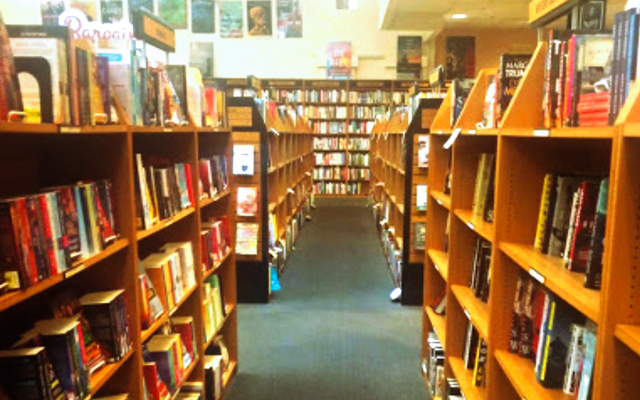So now your book is being published and you’re overwhelmed in general about things, and in specific about this event, and WHEN WILL THE HELPFUL EVENT WIZARD SHOW UP AND HELP YOU?
The wizard is in, friends, and it’s time to roll for initiative.
First, as a shiny new author, you should rethink how you look at events. It’s not just a single blip on your calendar and done. It’s a continuum. Your book event is like the first date in a long and fruitful relationship with a particular bookstore. Many authors have their first book events at their local bookstore, so this is a vital relationship.
And much like dating, debut book events can be confusing and stress-inducing. So where does a new author start?
Before the Event
If you’ve never seen a book launch or a reading, go to a few. If you’re lucky enough to have a local indie, go to the one that will be hosting you. Check out the space. See how they run events and what they do to promote. Talk to other author friends and ask about their first book launch—they might have tips. Don’t have a bookstore near you? Some post videos of their events online.
Don’t have a local indie or author friends? Don’t panic. You can reach out to the bookstore you’ll be visiting—or to your publicist if you have one. Is there anything you need to know about the space? I host events at my local independent bookstore, Third Place Books, and I know that our Events Coordinator sends out an information packet to publicists and authors. If you’re lucky enough to get something like this read it carefully. If you have questions, ask. Don’t just call up the bookstore and ask a random employee—ask the point of contact for the event. That way you know that you’re getting up to date (and correct) information.

Communication is key. If you have plans, run them by your publicist or event coordinator. Want to bring cake? Have a raffle? Bring Morris Dancers? A three piece band? Wine? Eight other authors? ASK. There might be very valid reasons why these things won’t be okay. Lack of a liquor license, for example. Not enough space for the Morris Dancers. They might not want the ink for your Japanese calligraphy station near their rare and collectable books. (You think I’m pulling these examples from thin air, don’t you?) Don’t assume they’ll have plates, forks, knives, etc., and plan to set these things up and clean up anything you brought once your event is over. Keep in mind that while this is a huge milestone for you, to the bookstore it’s a smaller piece in a larger event schedule. Of course they want to do everything they can to make your event a smashing success, but they might have to spread their attention to four other events that week… as well as possible off-site events, and the daily workings of a bookstore.
Have a presentation? Make sure they have the capabilities for it (like a screen, a projector, and sound) and see if you need to bring any particular dongle. (I can almost say dongle without laughing. Almost.) I would also think long and hard about whether or not you actually need that presentation. Unless your book has a highly visual element, I’d skip it.
Do your own outreach before hand. Hit social media and make sure you tag the bookstore involved. Don’t swamp your Twitter feed—a good suggestion is a week before, a few days before, and day of. Let readers know if they can preorder their books with the bookstore—my bookstore will also put books on hold for you. This not only makes sure the reader gets copies of the books they want, but let’s the bookstore know that people are planning to attend! Bookstores order books for events based on projected attendees, noise, and sales if the author has more than one title. For small and first time events, our store orders in around twenty copies on average. Despite all preparation and experience, stores can be blindsided by events. They might not know that you have a huge local fan base, family, book clubs or knitting groups attending. Let them know so that they can order accordingly.
Come prepared—bring your notes, pens, any bookmarks or swag, and a copy of your book with the pages marked for a reading, even if you don’t plan on reading. As an author, I’ve shown up to events before where I find out that they’ve presented it as a reading and I’ve had to scramble last minute and it’s terrible. Practice your reading or presentation before hand so you’re comfortable with it. And keep your reading short—best reading advice I got from my MFA professor? “If you don’t have them after five minutes, you’re certainly not going to have them after twenty.” You’re giving them a taste, not the whole menu.
Event Day
Make sure you have all your panicked ducks in a row. Hit social media. Double-check your bag to ensure you have all your gear. Then make sure you have the contact info that you need and that you know where you’re going and how you’re getting there. For example, my bookstore has three locations. They are a lengthy drive apart and Seattle traffic is like something out of Dante’s Inferno. Save yourself a panicked phone call to the bookstore staff, okay?
Arrive twenty minutes early at least. Have a presentation or set up? Give yourself more time. You can’t control everything, so if you are running late, call the bookstore. When you get there, introduce yourself to someone on staff and find out where you’re supposed to be. Treat the staff and host with respect—and even if the host says something factually incorrect, don’t interrupt their introduction. You can always say something when it’s your turn if you deem it necessary.
Details may vary, but the basics of a successful bookstore event are generally the same. You arrive before the event and introduce yourself. Touch base with the host and go over any last minute details. After the host introduces you, give your presentation, staying within the time you’ve been allotted and making sure you leave a little time for Q&A. (Don’t be upset if people don’t have questions. Not everyone likes to discuss things in front of a crowd, so they’ll save it for your signing.) Thank the bookstore and the attendees and hand things back over to the host. They will then instruct people on how the signing will go. Sign books. If there are any left over, offer to sign stock for the bookstore. And you’re done! Celebrate as you see fit.
Things don’t always go smoothly. Bookstore run out of books? Offer to sign bookmarks for people, drop by and sign stock later if you can, etc. For the love of all that is just and good, don’t tell your audience to go to Amazon. Just don’t. That’s like going to your mom’s for dinner and telling your dad that you could get cheaper meat loaf at the restaurant down the street. Amazon isn’t hosting you, but the bookstore is. If you send all the readers to buy their books elsewhere, you’re not going to have a bookstore to read at next time. You’re focused on sales, and I get that. No one is saying don’t bring up Amazon, Barnes & Noble, Indiebound, or eBooks ever, just time and place, you know?
Because there is an…
After the Event
Remember earlier when I said the event isn’t a blip, but an ongoing relationship? Like many industries these days, bookstores are well connected. Booksellers go to conventions and author meet and greets. They start Facebook pages where they can talk shop. They connect on social media. And they talk and exchange information. That includes which authors they love more than anything, and which authors were hard to handle. They’ll mention who screamed at them, and which books they are never, ever going to hand sell again. Most independent bookstores have healthy ties to local libraries, too, and booksellers and librarians are often at the same events, which means how an author presents themselves spreads beyond the bookstore community.
Like I said earlier, things happen during events and not everything is going to go smoothly. If you have a complaint, mention it to your publicist later. They often check in with the event staff to see how things went. Your publicist can then decide if they want to bring up your issue, and whether or not they want to continue to send authors to that particular store. I don’t recommend screaming at your event host. Ever. This solves nothing and no one likes to be yelled at. The person hosting you is often just there to host and might have no idea what you’re talking about anyway.
Thank the bookstore. They spent a lot of time setting up chairs, writing introductions, and getting the word out. This sells books, sure, but it also does what booksellers do best—connect readers to the books and authors they love. You can thank them on social media, in person, or you can even send a thank you note.
Your goal, as an author, is to try and make a lasting connection with the bookstore. Make them talk about your event and you (in a good way) long after you’re gone. This book might be your baby and the event your big day, but for the bookstore it’s just another Wednesday night. Your book is just another book in the hundreds of new books they’ll see that year. Try as they might, they just can’t read them all. Events help your book stand out a little. They let you to connect to the staff. As a bookseller I’ve sold a ton of books that I haven’t read, but know about because of events I’ve hosted. I can talk knowledgeably about the book and author. I’ve also sold books based on the sentence, “You know they’re local, right?” The wonderful souls that support their local bookshops also want to support local authors.
Your event is the first step for you to larger things, and a healthy relationship with your local bookshop can lead to future events and many copies sold.
 Lish McBride currently resides in Seattle, spending most of her time at her day job at Third Place Books in Lake Forest Park. The rest of her time is divided between writing, reading, and Twitter, where she either discusses her desire for a nap or her love for kittens. (Occasionally ponies.) Her debut novel, Hold Me Closer, Necromancer was named an American Library Association Best Book for Young Adults and was a finalist for the YALSA William C. Morris Award. Her other works include Necromancing the Stone, Firebug, and Pyromantic.
Lish McBride currently resides in Seattle, spending most of her time at her day job at Third Place Books in Lake Forest Park. The rest of her time is divided between writing, reading, and Twitter, where she either discusses her desire for a nap or her love for kittens. (Occasionally ponies.) Her debut novel, Hold Me Closer, Necromancer was named an American Library Association Best Book for Young Adults and was a finalist for the YALSA William C. Morris Award. Her other works include Necromancing the Stone, Firebug, and Pyromantic.










